2024年中考英语二轮句法复习课件:第十二节 连词和复合句(共40张PPT)
文档属性
| 名称 | 2024年中考英语二轮句法复习课件:第十二节 连词和复合句(共40张PPT) | 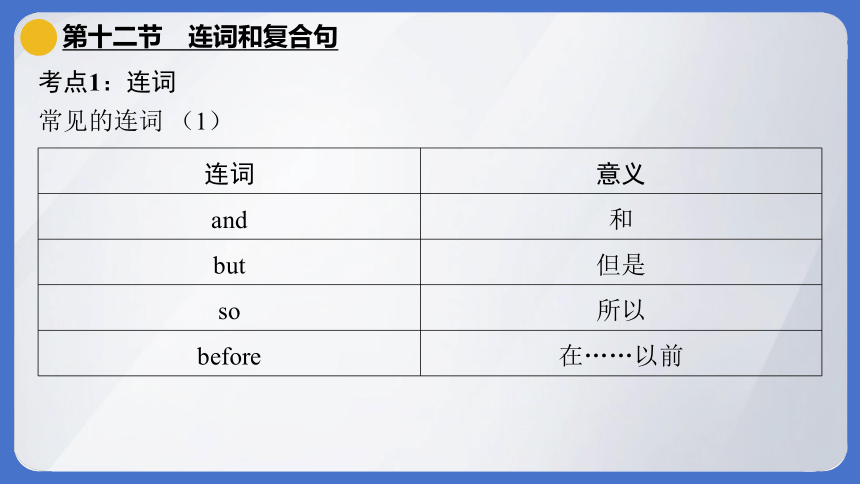 | |
| 格式 | pptx | ||
| 文件大小 | 1.3MB | ||
| 资源类型 | 教案 | ||
| 版本资源 | 通用版 | ||
| 科目 | 英语 | ||
| 更新时间 | 2024-02-25 18:10:09 | ||
图片预览

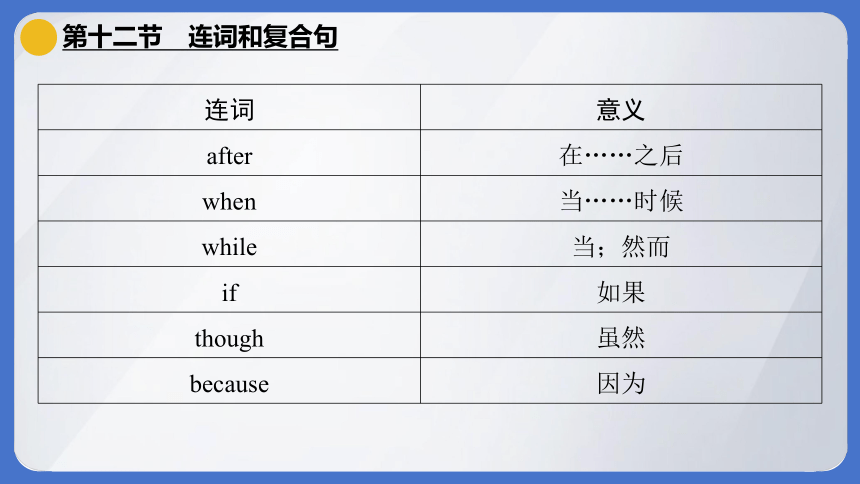
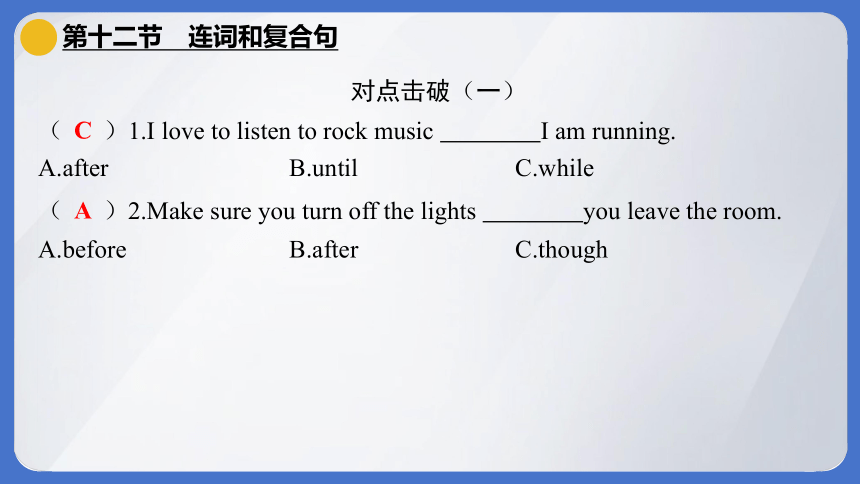
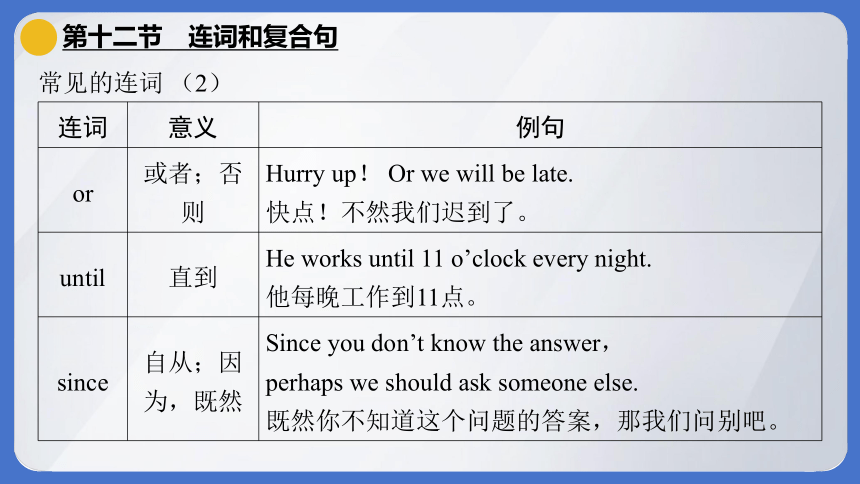
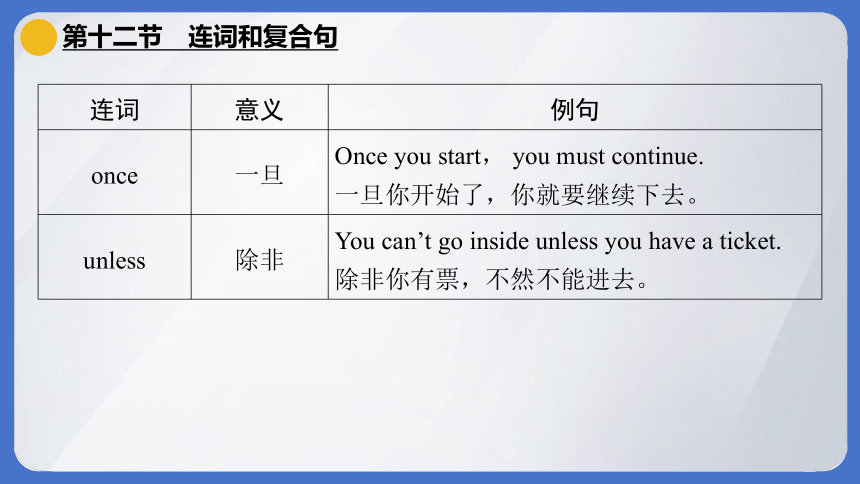
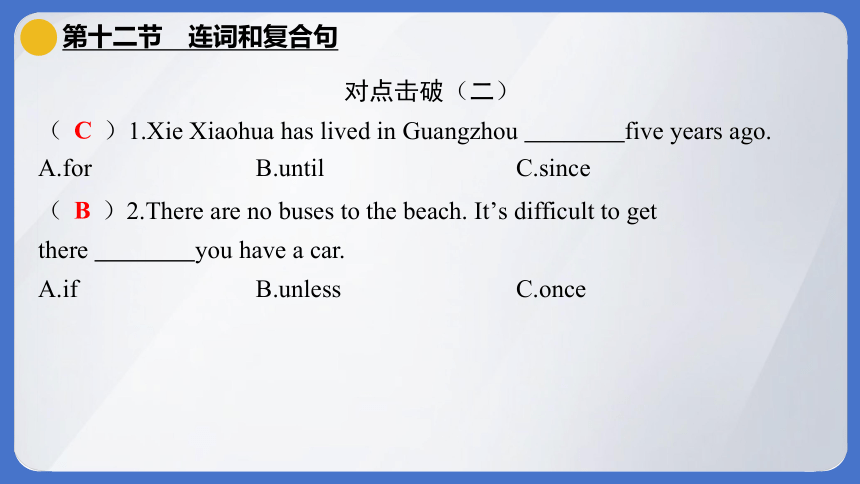
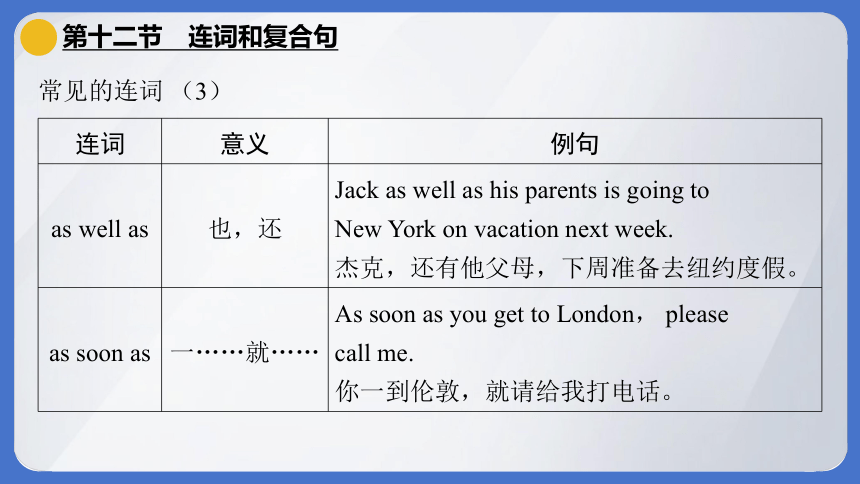
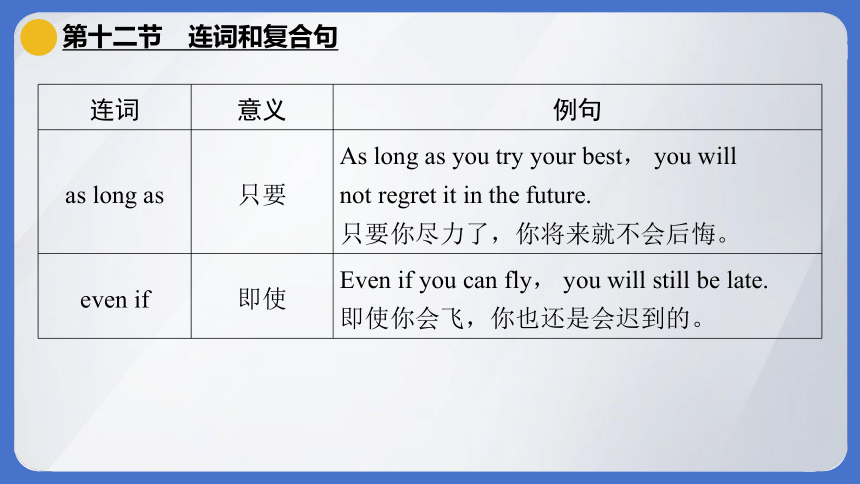
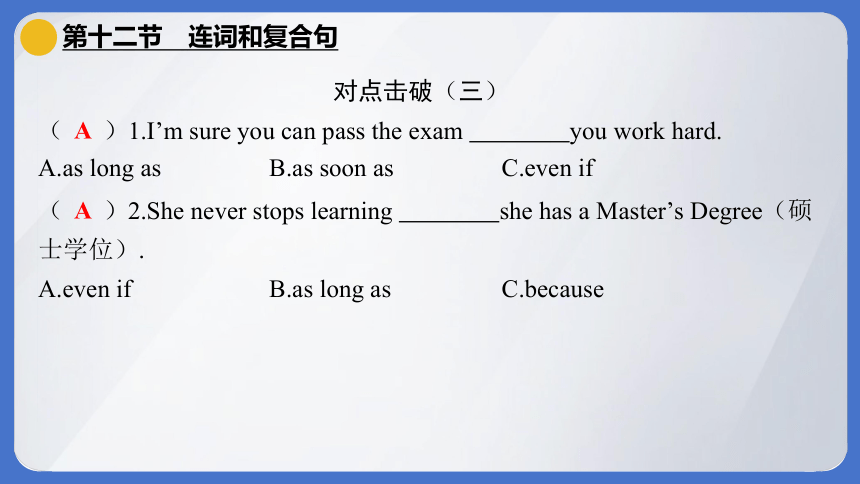
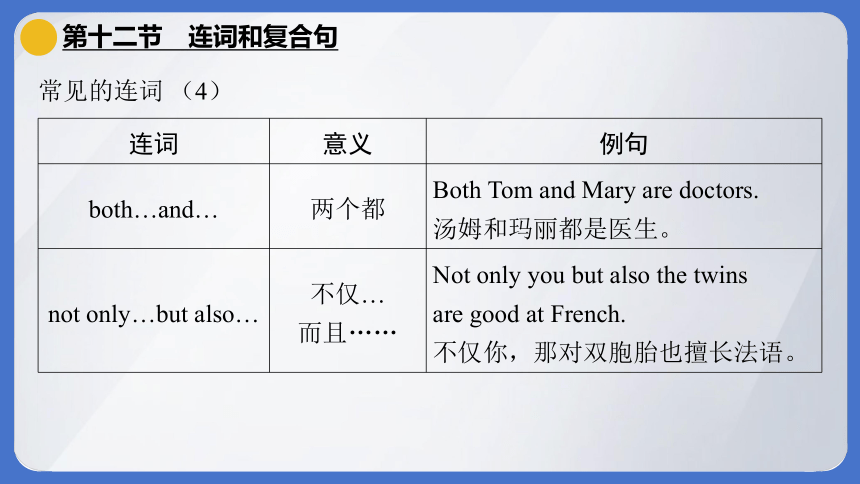
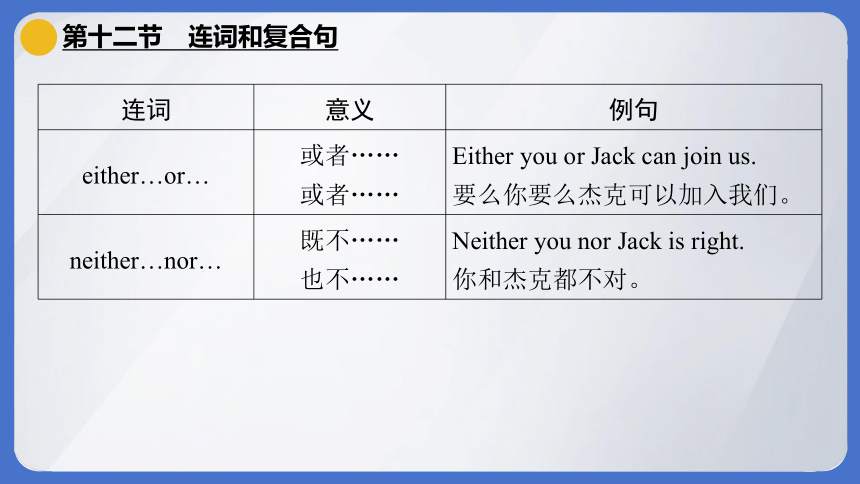
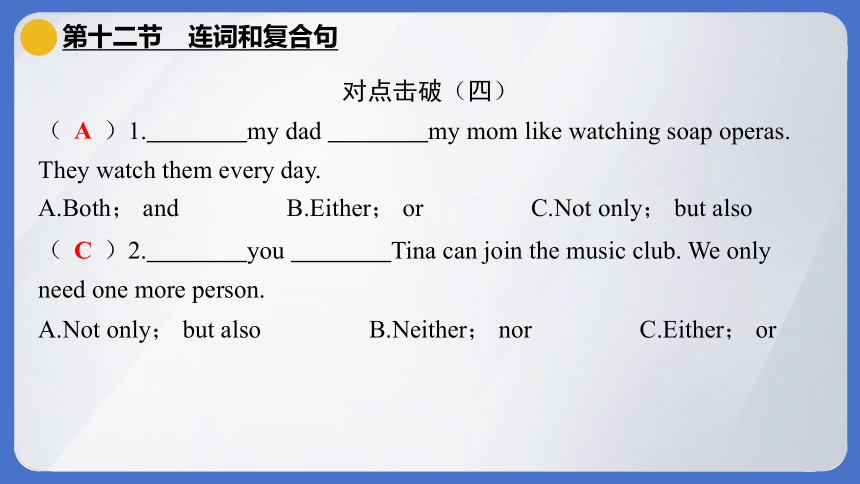
文档简介
(共40张PPT)
考点1:连词
常见的连词 (1)
连词 意义
and 和
but 但是
so 所以
before 在……以前
连词 意义
after 在……之后
when 当……时候
while 当;然而
if 如果
though 虽然
because 因为
对点击破(一)
( C )1.I love to listen to rock music I am running.
A.after B.until C.while
( A )2.Make sure you turn off the lights you leave the room.
A.before B.after C.though
C
A
常见的连词 (2)
连词 意义 例句
or 或者;否则 Hurry up! Or we will be late.
快点!不然我们迟到了。
until 直到 He works until 11 o’clock every night.
他每晚工作到11点。
since 自从;因为,既然 Since you don’t know the answer,
perhaps we should ask someone else.
既然你不知道这个问题的答案,那我们问别吧。
连词 意义 例句
once 一旦 Once you start, you must continue.
一旦你开始了,你就要继续下去。
unless 除非 You can’t go inside unless you have a ticket.
除非你有票,不然不能进去。
对点击破(二)
( C )1.Xie Xiaohua has lived in Guangzhou five years ago.
A.for B.until C.since
( B )2.There are no buses to the beach. It’s difficult to get
there you have a car.
A.if B.unless C.once
C
B
常见的连词 (3)
连词 意义 例句
as well as 也,还 Jack as well as his parents is going to
New York on vacation next week.
杰克,还有他父母,下周准备去纽约度假。
as soon as 一……就…… As soon as you get to London, please
call me.
你一到伦敦,就请给我打电话。
连词 意义 例句
as long as 只要 As long as you try your best, you will
not regret it in the future.
只要你尽力了,你将来就不会后悔。
even if 即使 Even if you can fly, you will still be late.
即使你会飞,你也还是会迟到的。
对点击破(三)
( A )1.I’m sure you can pass the exam you work hard.
A.as long as B.as soon as C.even if
( A )2.She never stops learning she has a Master’s Degree(硕
士学位).
A.even if B.as long as C.because
A
A
常见的连词 (4)
连词 意义 例句
both…and… 两个都 Both Tom and Mary are doctors.
汤姆和玛丽都是医生。
not only…but also… 不仅… 而且…… Not only you but also the twins
are good at French.
不仅你,那对双胞胎也擅长法语。
连词 意义 例句
either…or… 或者…… 或者…… Either you or Jack can join us.
要么你要么杰克可以加入我们。
neither…nor… 既不…… 也不…… Neither you nor Jack is right.
你和杰克都不对。
对点击破(四)
( A )1. my dad my mom like watching soap operas.
They watch them every day.
A.Both; and B.Either; or C.Not only; but also
( C )2. you Tina can join the music club. We only
need one more person.
A.Not only; but also B.Neither; nor C.Either; or
A
C
常见的连词 (5)
连词 意义 例句
so that 为了 He studies hard so that he can get into a good high school.
他努力学习是为了能上一个好高中。
so…that… 如此…以至于…… (so+形容词) The house is so expensive that I can’t afford it.
这座房子如此贵,以至于我买不起。
连词 意义 例句
such…that… 如此……以至于…… (such+名词) This is such an expensive house
that I can’t afford it.
这是如此贵的一座房子,以至
于我买不起。
对点击破(五)
( B )1.It’s good weather that I like to go out for a walk.
A.such a B.such C.so
( C )2.My dad works hard he can make more money.
A.in order to B.as soon as C.so that
B
C
考点2:状语从句
常见的状语从句有:
1.When I get to London , I will visit the Big Ben.(时间状语从句)
当我到伦敦时,我会去参观大本钟。
2.I will send you an e-mail as soon as I get to the office.(时间状语从句)
我一到办公室,就会给你发邮件。
3.He didn’t pass the exam because he didn’t study hard.(原因状语从句)
他没通过考试,因为他学习不努力。
4.If it rains tomorrow , I will stay at home.(条件状语从句)
如果明天下雨,我就待在家。
5.Although he has a lot of money , he doesn’t feel happy.(让步状
语从句)
虽然他有很多钱,但他不开心。
6.She studies hard so that she can get good grades.(目的状语从句)
她学习很努力,这样她就能取得好成绩。
【点拨1】如上述例句所示,非画线部分叫作主句;画线部分由when,
because, if等引导的从句就叫作状语从句。
【点拨2】中考高频考点:若主句用将来时,状语从句常使用一般现在
时。如:
If he the answer, he will tell me.
A.know B.knows C.will know
该题中,主句用将来时,所以从句使用一般现在时,排除C。由于he是
第三人称单数,所以选择B。
对点击破(六)
( C )1.If he to Beijing, he will visit the Great Wall.
A.go B.will go C.goes
( B )2. he is only five years old, he knows a lot about science.
A.Because B.Although C.If
C
B
考点3:定语从句
如果一个句子用于修饰名词或代词,即充当定语,那么这个句子就叫作
定语从句。如:
1.This is the camera (which I bought last year).
这是我去年买的照相机。
2.I’m reading a book (that was written by Tom).
我在读一本由汤姆写的书。
3.The man (who is standing under the tree) is Tom.
站在树下的那个人是汤姆。
4.Those (who have finished the work) can go home.
那些已经完成工作的人可以回家了。
【点拨1】初中阶段需掌握的关系代词主要有:which, who 和that。 当
先行词是“物”(camera)时,关系代词用which;当先行词是“人”
(man)时,关系代词用who。多数情况下,that可通用。
【点拨2】以下几种情况,关系代词只用that。
* 先行词是everything, anything等不定代词时:
This is everything (that I can tell you).
* 先行词有最高级修饰:
He is the tallest boy (that I have seen).
* 先行词有序数词修饰:
The first country (that I want to visit) is Australia.
* 先行词既有人又有物:
I can’t forget the people and places (that I know well).
对点击破(七)
( C )1.Do you like the movie we saw last night?
A.who B.what C.which
( B )2.This is the most interesting book I have ever read.
A.which B.that C.who
C
B
考点4: 宾语从句
宾语常跟在动词后面。如:在play football中,football是宾语。
如果一个句子充当宾语,那么这个句子就叫作宾语从句。如:
I think he is from Japan. (动词think后面的画线句子就叫作宾语从句。)
1.宾语从句的引导词
宾语从句的引导词主要有:that, when, where, who, what,
why, how, which, whose, if, whether 等。通常that可省略。
whether 和if 均有“是否”之意,但若后面有or not, 则用whether。如:
(1)I think (that) he is an honest boy.
我认为他是个诚实的孩子。
(2)Can you tell me how I can learn English well?
你能告诉我如何能学好英语吗?
(3)Please tell me if you can come to my birthday party.
请告诉我你是否能来我的生日晚会。
(4)I am not sure whether or not I can finish the job.
我不确定我是否能完成这项工作。
对点击破(八)
( C )1.—Could you please tell me I can improve my English?
—Maybe you can do more reading.
A.why B.what C.how
( C )2.I don’t know or not I can take a trip to Hong Kong next
week.
A.if B.when C.whether
C
C
2.宾语从句的语序
宾语从句的语序用陈述语序。如:
*Do you know what are you talking about? (×)
Do you know what you are talking about? (√)
*I want to know what did you buy yesterday. (×)
I want to know what you bought yesterday. (√)
对点击破(九)
( B )1.—Could you please tell me ? —I think it is on Center
Street.
A.where is the bookshop B.where the book shop is
C.how can I learn math well
( B )2.—Do you know ? —He walked here.
A.what time the next bus will arrive
B.how he came to school this morning
C.how did he come to school this morning
B
B
3.宾语从句的时态
*当主句是现在的某种时态,宾语从句根据实际情况使用合适的时态。
I have told you that I will buy a house in New York.
我已经跟你说过我会在纽约买房的。
Do you still remember what I told you yesterday?
你还记得我昨天跟你说什么了吗?
*当主句是过去的某种时态,宾语从句也使用过去的某种时态。
He said that he would buy me a birthday gift.
他说他会买一份生日礼物给我的。
*若宾语从句描述的是客观事实或真理时,用一般现在时。
Even a kid knows that the earth goes around the sun.
就算是个小孩也知道地球绕着太阳转。
对点击破(十)
( B )1.The weather report says it very hot this afternoon.
A.would be B.will be C.was
( A )2.My mom told me that Changjiang the longest river in
China.
A.is B.was C.will be
B
A
( B )1.It’s raining heavily, I have to stay at home.
A.but B.so C.because
( C )2.Please show me your ticket you enter the cinema.
A.after B.unless C.before
( A )3. it is raining hard, we still have to get there on time.
A.Although B.Because C.Since
B
C
A
( B )4. my dad my mom likes watching soap operas.
They think it is boring to watch them.
A.Both; and B.Neither; nor C.Not only; but also
( C )5.Do you know the girl is talking to my brother?
A.which B.whose C.who
( B )6.This is the best gift I have ever received.
A.what B.that C.which
( C )7.If it tomorrow, I will go fishing with my friend.
A.won’t rain B.rains C.doesn’t rain
B
C
B
C
( A )8.I’m not sure my advice is helpful to you.
A.if B.what C.why
( B )9.—Do you know ? —At 9 o’clock tomorrow morning.
A.when will the meeting begin
B.when the meeting will begin
C.when the meeting began
( B )10.Our physics teacher told us that light much faster than
sound.
A.traveled B.travels C.will travel
A
B
B
一、语法选择
Today let’s talk about body language. Body language is a very important
form(形式) of communication 1 is used around the world. In fact,
we use it quite often 2 we may not realize it. People 3 speak different languages can still understand each other. That is 4 they have the same ody language. For example, in many countries, people nod their heds to show 5 they agree with something. In many countries, people,especially businessmen, will shake hands 6 they meet.
However, body language is used differently in different countries. In
Japan, when people meet, they often bow; 7 people in Western
countries usually bow at the end of a stage(舞台) performance. The
thumbs-up(竖拇指) sign is widely used in many countries, 8 it is
highly offensive(冒犯的) in the Middle East. The “Come here” sign is
used in the United States to ask a person to come. 9 you do it in the
Philippines, you could be arrested(逮捕). Be sure to do some research
10 you use your body language in a new culture next time. Don’t get yourself into trouble.
( B )1.A.why B.which C.what
( C )2.A.because B.when C.although
( A )3.A.who B.which C.when
( B )4.A.why B.because C.whether
( A )5.A.that B.what C.where
( C )6.A.which B.before C.when
( C )7.A.when B.however C.while
( C )8.A.because B.or C.but
( C )9.A.Since B.Though C.If
( A )10.A.before B.after C.unless
B
C
A
B
A
C
C
C
C
A
二、短文填空(新考法)
请从方框内选择适当的词并用其正确形式填空,使文章完整连贯。
注意每空一词,每词仅用一次,有两词为多余项。
but who if how because what although
that when and why since
Jack has to write an article on protecting our planet. Here is what he
writes.
We often talk about 1 we can save our planet. Let me tell you 2
my family does every day to save the planet. Our family decides to recycle
(回收) everything to help save the planet 3 save money. My mom
uses old clothes 4 people don’t wear anymore to make bags. My mom
has been doing this 5 a few years ago. She sells the bags online. My
mum is really happy 6 she knows that people like her bags. What my
mom does can help to reduce a lot of waste.
We try to use our car less to cut down air pollution. My dad organizes a
car pool(拼车) with people 7 live near us. And I ride my bicycle to
school. You may wonder 8 it is tiring to ride the bike every day. Well,
it is a little tiring, 9 I enjoy it. Now more and more classmates join
me 10 they think it is a good way to save the planet and it is also good
for health. Would you also like to join me?
1. 2. 3. 4.
5. 6.
9.
how
what
and
that
since
when
who
if
but
because
7.
8.
10.
考点1:连词
常见的连词 (1)
连词 意义
and 和
but 但是
so 所以
before 在……以前
连词 意义
after 在……之后
when 当……时候
while 当;然而
if 如果
though 虽然
because 因为
对点击破(一)
( C )1.I love to listen to rock music I am running.
A.after B.until C.while
( A )2.Make sure you turn off the lights you leave the room.
A.before B.after C.though
C
A
常见的连词 (2)
连词 意义 例句
or 或者;否则 Hurry up! Or we will be late.
快点!不然我们迟到了。
until 直到 He works until 11 o’clock every night.
他每晚工作到11点。
since 自从;因为,既然 Since you don’t know the answer,
perhaps we should ask someone else.
既然你不知道这个问题的答案,那我们问别吧。
连词 意义 例句
once 一旦 Once you start, you must continue.
一旦你开始了,你就要继续下去。
unless 除非 You can’t go inside unless you have a ticket.
除非你有票,不然不能进去。
对点击破(二)
( C )1.Xie Xiaohua has lived in Guangzhou five years ago.
A.for B.until C.since
( B )2.There are no buses to the beach. It’s difficult to get
there you have a car.
A.if B.unless C.once
C
B
常见的连词 (3)
连词 意义 例句
as well as 也,还 Jack as well as his parents is going to
New York on vacation next week.
杰克,还有他父母,下周准备去纽约度假。
as soon as 一……就…… As soon as you get to London, please
call me.
你一到伦敦,就请给我打电话。
连词 意义 例句
as long as 只要 As long as you try your best, you will
not regret it in the future.
只要你尽力了,你将来就不会后悔。
even if 即使 Even if you can fly, you will still be late.
即使你会飞,你也还是会迟到的。
对点击破(三)
( A )1.I’m sure you can pass the exam you work hard.
A.as long as B.as soon as C.even if
( A )2.She never stops learning she has a Master’s Degree(硕
士学位).
A.even if B.as long as C.because
A
A
常见的连词 (4)
连词 意义 例句
both…and… 两个都 Both Tom and Mary are doctors.
汤姆和玛丽都是医生。
not only…but also… 不仅… 而且…… Not only you but also the twins
are good at French.
不仅你,那对双胞胎也擅长法语。
连词 意义 例句
either…or… 或者…… 或者…… Either you or Jack can join us.
要么你要么杰克可以加入我们。
neither…nor… 既不…… 也不…… Neither you nor Jack is right.
你和杰克都不对。
对点击破(四)
( A )1. my dad my mom like watching soap operas.
They watch them every day.
A.Both; and B.Either; or C.Not only; but also
( C )2. you Tina can join the music club. We only
need one more person.
A.Not only; but also B.Neither; nor C.Either; or
A
C
常见的连词 (5)
连词 意义 例句
so that 为了 He studies hard so that he can get into a good high school.
他努力学习是为了能上一个好高中。
so…that… 如此…以至于…… (so+形容词) The house is so expensive that I can’t afford it.
这座房子如此贵,以至于我买不起。
连词 意义 例句
such…that… 如此……以至于…… (such+名词) This is such an expensive house
that I can’t afford it.
这是如此贵的一座房子,以至
于我买不起。
对点击破(五)
( B )1.It’s good weather that I like to go out for a walk.
A.such a B.such C.so
( C )2.My dad works hard he can make more money.
A.in order to B.as soon as C.so that
B
C
考点2:状语从句
常见的状语从句有:
1.When I get to London , I will visit the Big Ben.(时间状语从句)
当我到伦敦时,我会去参观大本钟。
2.I will send you an e-mail as soon as I get to the office.(时间状语从句)
我一到办公室,就会给你发邮件。
3.He didn’t pass the exam because he didn’t study hard.(原因状语从句)
他没通过考试,因为他学习不努力。
4.If it rains tomorrow , I will stay at home.(条件状语从句)
如果明天下雨,我就待在家。
5.Although he has a lot of money , he doesn’t feel happy.(让步状
语从句)
虽然他有很多钱,但他不开心。
6.She studies hard so that she can get good grades.(目的状语从句)
她学习很努力,这样她就能取得好成绩。
【点拨1】如上述例句所示,非画线部分叫作主句;画线部分由when,
because, if等引导的从句就叫作状语从句。
【点拨2】中考高频考点:若主句用将来时,状语从句常使用一般现在
时。如:
If he the answer, he will tell me.
A.know B.knows C.will know
该题中,主句用将来时,所以从句使用一般现在时,排除C。由于he是
第三人称单数,所以选择B。
对点击破(六)
( C )1.If he to Beijing, he will visit the Great Wall.
A.go B.will go C.goes
( B )2. he is only five years old, he knows a lot about science.
A.Because B.Although C.If
C
B
考点3:定语从句
如果一个句子用于修饰名词或代词,即充当定语,那么这个句子就叫作
定语从句。如:
1.This is the camera (which I bought last year).
这是我去年买的照相机。
2.I’m reading a book (that was written by Tom).
我在读一本由汤姆写的书。
3.The man (who is standing under the tree) is Tom.
站在树下的那个人是汤姆。
4.Those (who have finished the work) can go home.
那些已经完成工作的人可以回家了。
【点拨1】初中阶段需掌握的关系代词主要有:which, who 和that。 当
先行词是“物”(camera)时,关系代词用which;当先行词是“人”
(man)时,关系代词用who。多数情况下,that可通用。
【点拨2】以下几种情况,关系代词只用that。
* 先行词是everything, anything等不定代词时:
This is everything (that I can tell you).
* 先行词有最高级修饰:
He is the tallest boy (that I have seen).
* 先行词有序数词修饰:
The first country (that I want to visit) is Australia.
* 先行词既有人又有物:
I can’t forget the people and places (that I know well).
对点击破(七)
( C )1.Do you like the movie we saw last night?
A.who B.what C.which
( B )2.This is the most interesting book I have ever read.
A.which B.that C.who
C
B
考点4: 宾语从句
宾语常跟在动词后面。如:在play football中,football是宾语。
如果一个句子充当宾语,那么这个句子就叫作宾语从句。如:
I think he is from Japan. (动词think后面的画线句子就叫作宾语从句。)
1.宾语从句的引导词
宾语从句的引导词主要有:that, when, where, who, what,
why, how, which, whose, if, whether 等。通常that可省略。
whether 和if 均有“是否”之意,但若后面有or not, 则用whether。如:
(1)I think (that) he is an honest boy.
我认为他是个诚实的孩子。
(2)Can you tell me how I can learn English well?
你能告诉我如何能学好英语吗?
(3)Please tell me if you can come to my birthday party.
请告诉我你是否能来我的生日晚会。
(4)I am not sure whether or not I can finish the job.
我不确定我是否能完成这项工作。
对点击破(八)
( C )1.—Could you please tell me I can improve my English?
—Maybe you can do more reading.
A.why B.what C.how
( C )2.I don’t know or not I can take a trip to Hong Kong next
week.
A.if B.when C.whether
C
C
2.宾语从句的语序
宾语从句的语序用陈述语序。如:
*Do you know what are you talking about? (×)
Do you know what you are talking about? (√)
*I want to know what did you buy yesterday. (×)
I want to know what you bought yesterday. (√)
对点击破(九)
( B )1.—Could you please tell me ? —I think it is on Center
Street.
A.where is the bookshop B.where the book shop is
C.how can I learn math well
( B )2.—Do you know ? —He walked here.
A.what time the next bus will arrive
B.how he came to school this morning
C.how did he come to school this morning
B
B
3.宾语从句的时态
*当主句是现在的某种时态,宾语从句根据实际情况使用合适的时态。
I have told you that I will buy a house in New York.
我已经跟你说过我会在纽约买房的。
Do you still remember what I told you yesterday?
你还记得我昨天跟你说什么了吗?
*当主句是过去的某种时态,宾语从句也使用过去的某种时态。
He said that he would buy me a birthday gift.
他说他会买一份生日礼物给我的。
*若宾语从句描述的是客观事实或真理时,用一般现在时。
Even a kid knows that the earth goes around the sun.
就算是个小孩也知道地球绕着太阳转。
对点击破(十)
( B )1.The weather report says it very hot this afternoon.
A.would be B.will be C.was
( A )2.My mom told me that Changjiang the longest river in
China.
A.is B.was C.will be
B
A
( B )1.It’s raining heavily, I have to stay at home.
A.but B.so C.because
( C )2.Please show me your ticket you enter the cinema.
A.after B.unless C.before
( A )3. it is raining hard, we still have to get there on time.
A.Although B.Because C.Since
B
C
A
( B )4. my dad my mom likes watching soap operas.
They think it is boring to watch them.
A.Both; and B.Neither; nor C.Not only; but also
( C )5.Do you know the girl is talking to my brother?
A.which B.whose C.who
( B )6.This is the best gift I have ever received.
A.what B.that C.which
( C )7.If it tomorrow, I will go fishing with my friend.
A.won’t rain B.rains C.doesn’t rain
B
C
B
C
( A )8.I’m not sure my advice is helpful to you.
A.if B.what C.why
( B )9.—Do you know ? —At 9 o’clock tomorrow morning.
A.when will the meeting begin
B.when the meeting will begin
C.when the meeting began
( B )10.Our physics teacher told us that light much faster than
sound.
A.traveled B.travels C.will travel
A
B
B
一、语法选择
Today let’s talk about body language. Body language is a very important
form(形式) of communication 1 is used around the world. In fact,
we use it quite often 2 we may not realize it. People 3 speak different languages can still understand each other. That is 4 they have the same ody language. For example, in many countries, people nod their heds to show 5 they agree with something. In many countries, people,especially businessmen, will shake hands 6 they meet.
However, body language is used differently in different countries. In
Japan, when people meet, they often bow; 7 people in Western
countries usually bow at the end of a stage(舞台) performance. The
thumbs-up(竖拇指) sign is widely used in many countries, 8 it is
highly offensive(冒犯的) in the Middle East. The “Come here” sign is
used in the United States to ask a person to come. 9 you do it in the
Philippines, you could be arrested(逮捕). Be sure to do some research
10 you use your body language in a new culture next time. Don’t get yourself into trouble.
( B )1.A.why B.which C.what
( C )2.A.because B.when C.although
( A )3.A.who B.which C.when
( B )4.A.why B.because C.whether
( A )5.A.that B.what C.where
( C )6.A.which B.before C.when
( C )7.A.when B.however C.while
( C )8.A.because B.or C.but
( C )9.A.Since B.Though C.If
( A )10.A.before B.after C.unless
B
C
A
B
A
C
C
C
C
A
二、短文填空(新考法)
请从方框内选择适当的词并用其正确形式填空,使文章完整连贯。
注意每空一词,每词仅用一次,有两词为多余项。
but who if how because what although
that when and why since
Jack has to write an article on protecting our planet. Here is what he
writes.
We often talk about 1 we can save our planet. Let me tell you 2
my family does every day to save the planet. Our family decides to recycle
(回收) everything to help save the planet 3 save money. My mom
uses old clothes 4 people don’t wear anymore to make bags. My mom
has been doing this 5 a few years ago. She sells the bags online. My
mum is really happy 6 she knows that people like her bags. What my
mom does can help to reduce a lot of waste.
We try to use our car less to cut down air pollution. My dad organizes a
car pool(拼车) with people 7 live near us. And I ride my bicycle to
school. You may wonder 8 it is tiring to ride the bike every day. Well,
it is a little tiring, 9 I enjoy it. Now more and more classmates join
me 10 they think it is a good way to save the planet and it is also good
for health. Would you also like to join me?
1. 2. 3. 4.
5. 6.
9.
how
what
and
that
since
when
who
if
but
because
7.
8.
10.
同课章节目录
- 词法
- 名词
- 动词和动词短语
- 动词语态
- 动词时态
- 助动词和情态动词
- 非谓语动词
- 冠词
- 代词
- 数词和量词
- 形容词副词及其比较等级
- 介词和介词短语
- 连词和感叹词
- 构词法
- 相似、相近词比较
- 句法
- 陈述句
- 一般疑问句和否定疑问句
- 特殊疑问句及选择疑问句
- 反意疑问句
- 存在句(There be句型)
- 宾语从句
- 定语从句
- 状语从句
- 主谓一致问题
- 简单句
- 并列句
- 复合句
- 主谓一致
- 主、表语从句
- 名词性从句
- 直接引语和间接引语
- 虚拟语气
- 感叹句
- 强调句
- 倒装句
- 祈使句
- 句子的成分
- 句子的分类
- 题型专区
- 单项选择部分
- 易错题
- 完形填空
- 阅读理解
- 词汇练习
- 听说训练
- 句型转换
- 补全对话
- 短文改错
- 翻译
- 书面表达
- 任务型阅读
- 语法填空
- 其他资料
